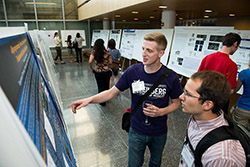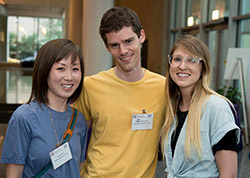
During the annual Medical Scientist Training Program (MSTP) Student-Faculty Retreat, Sara Fossum shared her research with peers, faculty, and – this year – alumni.
The MD/PhD program invited graduates back to the medical school from July 18-19 to celebrate the program’s 50th anniversary. This weekend also served to welcome the 14 members of the incoming class.
“It is great having alumni join us on this year’s retreat,” said Fossum, a third-year graduate student in the lab of Ann Harris, PhD. She presented on the regulatory roles of the gene EHF in the lungs. “Talking to alumni I can get an idea of the different career paths that are available after I finish the program. Also, by talking to different physician-scientists, I get a broad perspective on research happening in other fields.”
Since 1928, more than 250 MD/PhD students have graduated from the medical school. While the first MD/PhD student attended in the 1920s, the program started in 1964 when Northwestern became one of the three original universities to receive funding by the National Institutes of Health.
Kicking off the retreat activities, Dane Chetkovich, MD, PhD, director of MSTP, welcomed guests and introduced the first speaker of the evening, Rex Chisholm, PhD, vice dean of Scientific Affairs and Graduate Education.
“This retreat will be especially meaningful because of the milestone that it represents,” said Chisholm. “From the perspective of the school, the MSTP program is one of the premier programs. We recruit some of the top students around the country and we are really proud of all of you as being part of the MSTP.”
Chisholm introduced the next speaker, David Engman, MD, PhD, ’95 GME, professor of Pathology and Microbiology-Immunology. Former director of the program, Dr. Engman gave a history of the program. He spoke about former directors, notable graduates and the impact of the students.

“The students have always driven the program development, at least since I’ve been around,” he said. “And the spirit is what really inspires us as faculty and keeps us excited about doing what we do, those of us who run research labs.”
Todd A. Kuiken, ‘90 MD/PhD, ’91 ’95 GME, associate dean for Hospital Academic Affairs at the Rehabilitation Institute of Chicago, gave the capstone speech. Dr. Kuiken spoke about his journey as a MSTP student at Feinberg and his research career in prosthetics.
“Having arm loss is a terrible disability, but I find the emotional disability for upper limb amputations to probably be the bigger problem that we spend a lot of time on in the clinic,” said Dr. Kuiken, also a professor in Physical Medicine and Rehabilitation, McCormick School of Engineering and Surgery.
He continued to talk about his process for developing a technique using nerve transfers to improve myoelectric control of prosthetics called targeted reinnervation.
He concluded with, “Northwestern has grown enormously. It will be interesting to see where this campus goes in another 10 or 20 years, when you are approaching your middle life and it has been a wild ride, and I hope you have half as much fun as I did.”
Following his talk, guests attended a poster session highlighting science from current students and a reception.
“I enjoyed listening to Dr. Engman talk about the history of our program,” said Adrienne Long, a third-year graduate student. “It’s great to know that Northwestern was one of the first three MD/PhD programs funded by NIH.”
Long presented her poster, “Rapid Exhaustion in Human T-Cells Induced by Chimeric Antigen Receptor Ectodomain Interactions.” She studies the molecular mechanisms behind inflammation in the laboratories of Crystal Mackall, MD, chief of the Pediatric Oncology Branch of the National Cancer Institute, and Richard Longnecker, PhD, professor in Microbiology-Immunology.
“This annual event is a good opportunity to talk to people outside of your research area and get their unique perspectives. I enjoy the experience of getting to know everyone else in the program. We are all in different stages and it’s a great opportunity to get together and talk about science.”






